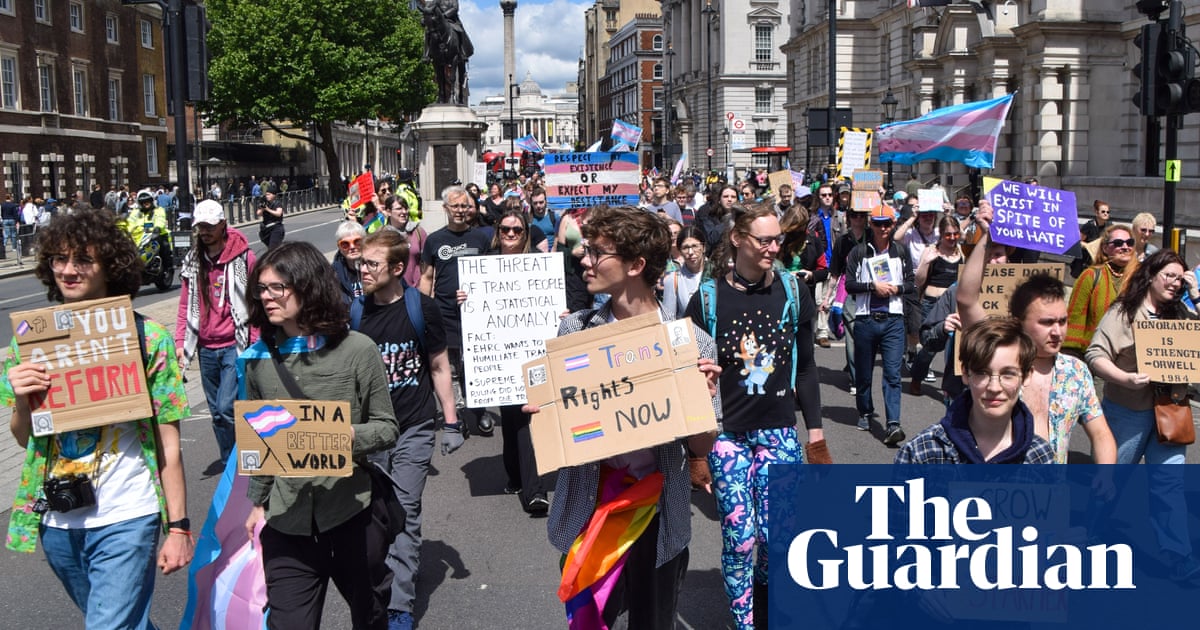Transgender people must accept a reduction in their rights after the supreme court decision on gender because they “have been lied to over many years” about what their rights actually were, one of the commissioners drawing up the official post-ruling guidance has said.
Speakingat a debateabout the repercussions of April’sruling that “woman” in the Equality Act refers only to a biological woman, Akua Reindorf said trans people had been misled about their rights and there “has to be a period of correction”.
Reindorf, a barrister who is one ofeight commissionersat the Equality and Human Rights Commission (EHRC), who was speaking in a personal capacity, said she believes the fault lay with trans lobbyists.
However, the human rights campaign groups Liberty and Amnesty called on the EHRC to make sure the rights of trans people were properly considered when it draws up guidance for public bodies on how to implement the changed legal landscape.
A director of the trans campaign group TransActual said Reindorf’s remarks were profoundly unhelpful.
Speaking at the event, organised by the London School of Economics law school, Reindorf argued that the impact of the ruling was very clear, condemning what she called “this huge farce with organisations up and down the country wringing their hands and creating working groups and so on, and people in society worrying that they will have nowhere to go to the toilet”.
Asked by an audience member about worries the ruling could reduce the rights of trans people, another panellist, the barrister Naomi Cunningham, said trans people “will have to give way”, adding: “It can’t be helped, I’m afraid.”
Reindorf, speaking next, agreed: “Unfortunately, young people and trans people have been lied to over many years about what their rights are. It’s like Naomi said – I just can’t say it in a more diplomatic way than that. They have been lied to, and there has to be a period of correction, because other people have rights.”
Reindorf said her comments reflected the fact that before the ruling, the law had been commonly misunderstood because pressure groups argued that trans people who self-identified should be treated as their identified sex, when this was in fact just the case for people with a gender recognition certificate (GRC).
The supreme court decided that this mix of different rights made the Equality Act unworkable, said Reindorf, speaking in a personal capacity. She called this “the catalyst for many to catch up, belatedly, with the fact that the law never permitted self-ID in the first place”.
“The fact is that, until now, trans people without GRCs were being grievously misled about their legal rights,” she said. “The correction of self-ID policies and practices will inevitably feel like a loss of rights for trans people. This unfortunate position is overwhelmingly a product of the misinformation which was systematically disseminated over a long period by lobby groups and activists.”
In April, the EHRC releasedinterim, non-statutory adviceabout how to interpret the ruling, which set out that transgender people should not be allowed to use toilets of the gender they live as, and that in some cases they cannot use toilets of their birth sex. A number of critics have called the advice oversimplistic.
Chiara Capraro, head of gender justice at Amnesty International UK, said: “The EHRC has the duty to uphold the rights of everyone, including all with protected characteristics. We are concerned that it is failing to do so and is unhelpfully pitting the rights of women and trans people against each other.”
Sign up toFirst Edition
Our morning email breaks down the key stories of the day, telling you what’s happening and why it matters
after newsletter promotion
Akiko Hart, Liberty’s director, said: “Any updated guidance from the EHRC must respect and uphold the rights of everyone in society. The supreme court’s judgment was very narrow, and there are a lot of very legitimate questions about how it’s implemented that must be carefully considered.”
A director of the trans campaign group TransActual,jane fae, rejected Reindorf’s argument: “The characterisation of what was previously a widely held view both by the EHRC as well as by civil servants and lawyers working in the field of equality as ‘lying’ is profoundly unhelpful.
“Prior to the ruling of the supreme court in April, trans people just wanted to live their lives within the framework as it was understood. ‘Activism’ has only really come into being over the last few years in response to a never-ending campaign designed to deprive trans people of rights.”
A spokesperson for the EHRC said: “Akua Reindorf KC spoke at this event in a personal capacity. This was made clear at the event and in the video recording published online.
“As Britain’s equality regulator, the Equality and Human Rights Commission upholds and enforces the Equality Act 2010 to ensure everyone is treated fairly, consistent with the act.
“Our board come from all walks of life and bring with them a breadth of skills and experience. This helps us take impartial decisions, which are always based on evidence and the law.”
